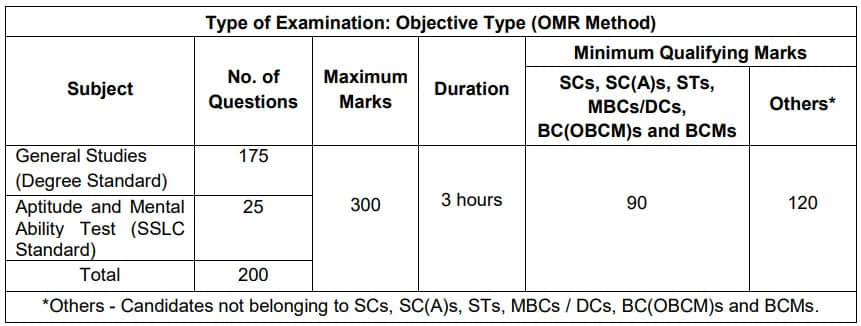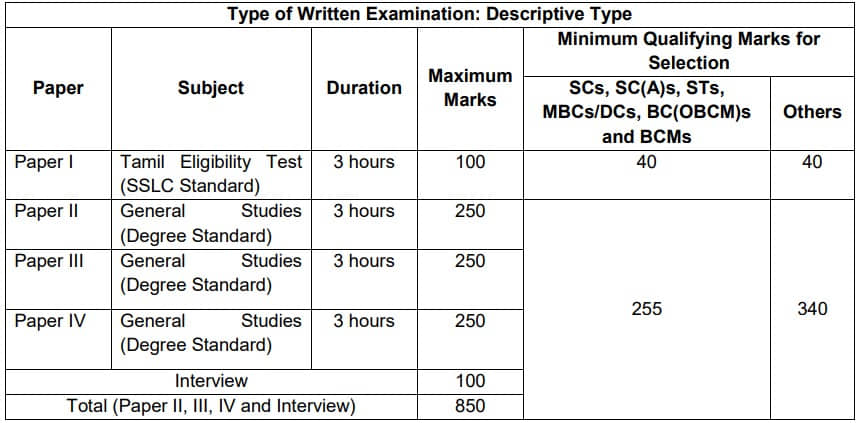TNPSC Group 1 Syllabus and Exam Pattern PDF:
TNPSC Group 1 Exam notification was released on 28th March 2024. It’s not easy to clear the exam without knowing the TNPSC Group 1 Prelims and Main Syllabus. Group 1 Syllabus 2024 was released officially by TNPSC in English & Tamil Medium PDF. First and foremost is to understand the syllabus, and go through it once before starting to prepare. Prepare a Study plan/ Preparation plan based on the TNPSC Group 1 Syllabus and try to follow that plan prepared. Also, see the TNPSC Group 1 Exam Pattern below. Complete TNPSC Group 1 Syllabus and Study Material Books 2024 for the Preliminary and Main Examination available on our site, check the link below. Here is the TNPSC Group 1 Syllabus 2024 PDF Free Download in English and Tamil Medium below:
For TNPSC Group 1 Preliminary Exam New Syllabus PDF, Click to download – TNPSC Group 1 Syllabus PDF
TNPSC Group 1 Exam Selection Procedure:
The Group 1 Examination is based on 3 modes:
- Preliminary Examination
- Main/ Written Examination
- Oral Interview
TNPSC Group 1 Prelims Exam Pattern:
Group 1 Prelims Exam Pattern for the upcoming exam is given below:
TNPSC Group 1 Prelims Syllabus:
TNPSC Group 1 Prelims Syllabus consists of 2 parts: 1. General Studies and 2. Aptitude Test. The complete syllabus list is given below:
Unit I – General Science:
General Science topics in four streams: Physics, Chemistry, Botany, and Zoology:
(i)
- Scientific Knowledge and Scientific Temper
- Power of Reasoning
- Rote Learning Vs Conceptual Learning
- Science as a tool to understand the past, present, and future.
(ii)
- Nature of Universe
- General Scientific Laws
- Mechanics
- Properties of Matter, Force, Motion, and Energy
- Everyday application of the basic principles of Mechanics, Electricity and Magnetism, Light, Sound, Heat, Nuclear Physics, Laser, Electronics, and Communications.
(iii)
- Elements and Compounds
- Acids, Bases, Salts
- Petroleum Products, Fertilizers, and Pesticides.
(iv)
- Main Concepts of Life Science
- Classification of Living Organisms
- Evolution, Genetics, Physiology
- Nutrition, Health and Hygiene, and Human diseases.
(v) Environment and Ecology.
Unit II – Current Affairs:
(i)
- History
- Latest diary of events
- National symbols
- Profile of States
- Eminent personalities and places in the news
- Sports – Books and authors.
(ii)
- Polity – Political parties and political system in India –
- Public Awareness and General Administration
- Welfare-oriented Government schemes and their utility, Problems in Public Delivery Systems.
(iii) Geography – Geographical landmarks.
(iv) Economics – Current socioeconomic issues.
Unit III – Geography:
(i)
- Location
- Physical features – Monsoon, rainfall, weather, and climate
- Water resources – Rivers in India
- Soil, minerals, and natural resources
- Forest and wildlife
- Agricultural pattern.
(ii) Transport – Communication.
(iii)
- Social geography
- Population density and distribution
- Racial, linguistic groups, and major tribes.
(iv)
- Natural calamity
- Disaster Management
- Environmental pollution: Reasons and preventive measures
- Climate change
- Green energy.
Unit IV – History and Culture of India:
(i)
- Indus valley civilization
- Guptas, Delhi Sultans, Mughals, and Marathas
- Age of Vijayanagaram and Bahmani Kingdoms
- South Indian history.
(ii)
- Change and Continuity in the Socio
- Cultural History of India.
(iii)
- Characteristics of Indian culture
- Unity in diversity
- Race, language, custom.
(iv) India as a Secular State, Social Harmony.
Unit V – Indian Polity:
(i)
- Constitution of India
- The preamble to the Constitution
- Salient Features of the Constitution
- Union, State, and Union Territory.
(ii)
- Citizenship
- Fundamental Rights
- Fundamental Duties
- Directive Principles of State Policy.
(iii)
- Union Executive, Union legislature
- State Executive, State Legislature
- Local governments, Panchayat Raj.
(iv) Spirit of Federalism: center-state Relationships.
(v) Election – Judiciary in India – Rule of law.
(vi) Corruption in public life – Anti-corruption measures – Lokpal and Lokayukta – Right to Information – Empowerment of women – Consumer protection forums, Human rights charter.
Unit VI – Indian Economy:
(i)
- Nature of the Indian economy
- Five-year plan models
- An assessment
- Planning Commission and Niti Ayog.
(ii)
- Sources of revenue
- Reserve Bank of India
- Fiscal Policy and Monetary Policy
- Finance Commission
- Resource sharing between Union and State Governments
- Goods and Services Tax.
(iii)
- Structure of Indian Economy and Employment Generation
- Land Reforms and Agriculture
- Application of Science and Technology in Agriculture
- Industrial growth – Rural welfare-oriented programs
- Social problems – Population, education, health, employment, poverty.
Unit VII – Indian National Movement:
(i)
- National renaissance
- The early uprising against British rule
- Indian National Congress
- The emergence of leaders – B.R.Ambedkar, Bhagat Singh, Bharathiar, V.O.Chidambaranar, Jawaharlal Nehru, Kamarajar, Mahatma Gandhi, Maulana Abul Kalam Azad, Thanthai Periyar, Rajaji, Subash Chandra Bose, and others.
(ii) Different modes of Agitation: Growth of Satyagraha and Militant movements.
(iii) Communalism and partition.
Unit VIII – History, Culture, Heritage, and Socio-Political Movements in Tamil Nadu:
(i) History of Tamil Society, related Archaeological discoveries, Tamil Literature from Sangam age till contemporary times.
(ii) Thirukkural :
(a) Significance as a Secular literature
(b) Relevance to Everyday Life
(c) Impact of Thirukkural on Humanity
(d) Thirukkural and Universal Values – Equality, Humanism, etc
(e) Relevance to Socio – Politico-Economic affairs
(f ) Philosophical content in Thirukkural
(iii) Role of Tamil Nadu in freedom struggle – Early agitations against British Rule – Role of women in the freedom struggle.
(iv) Evolution of 19th and 20th Century Socio-Political movements in Tamil Nadu – Justice Party, Growth of Rationalism – Self Respect Movement, Dravidian movement, and Principles underlying both these movements, Contributions of Thanthai Periyar and Perarignar Anna.
Unit IX – Development Administration in Tamil Nadu:
(i) Human Development Indicators in Tamil Nadu and a comparative assessment across the Country – Impact of Social Reform movements in the Socio-Economic Development of Tamil Nadu.
(ii) Political parties and Welfare schemes for various sections of people – Rationale behind Reservation Policy and access to Social Resources – Economic trends in Tamil Nadu – Role and impact of social welfare schemes in the Socio-economic development of Tamil Nadu.
(iii) Social Justice and Social Harmony as the Cornerstones of Socio-Economic Development.
(iv) Education and Health systems in Tamil Nadu.
(v) Geography of Tamil Nadu and its impact on Economic growth.
(vi) Achievements of Tamil Nadu in various fields.
(vii) e-governance in Tamil Nadu.
Unit X – Aptitude & Mental Ability Test:
(i) Simplification – Percentage – Highest Common Factor (HCF) – Lowest Common Multiple (LCM).
(ii) Ratio and Proportion.
(iii) Simple interest – Compound interest – Area – Volume – Time and Work.
(iv) Logical Reasoning – Puzzles-Dice – Visual Reasoning – Alphanumeric Reasoning – Number Series.
Note:
For TNPSC Group 1 Preliminary Exam New Syllabus PDF, click to download – TNPSC Group 1 Syllabus PDF.
Group 1 prelims previous year question paper PDF, Click the link to view – TNPSC Group 1 Question Papers
Group 1 prelims model question paper PDF, Check the link – TNPSC Group 1 Model Question papers.
TNPSC Group 1 Mains Exam Pattern:
Group 1 Main examination pattern is given below:
For the complete TNPSC Group 1 revised syllabus PDF, Check the link – TNPSC Group 1 Main Syllabus PDF.
TNPSC Group 1 Study Materials PDF Free download – TNPSC Group 1 Study Materials


